How to draw Cartoon face
1. Create Our First Character
The basic cartoon shape is a circle. Circle Is All You Need (besides Love, of course). It's from the circle that you define the basic proportions of your character's head.

Once the circle is ready, it's time to trace the face axis. Draw a vertical and horizontal line intersecting at the center, like in the image below:

Step 1
To make the eyes, draw an oval shape with a slight tilt to the side at the top. Repeat on opposite side. It is important to leave a gap between them of approximately the same size as an eye. As we are in the drafting phase, you can draw another eye in the center to serve as a measure.

Step 2
At the top of the circle, slightly thicken the trait that will be the eyelashes of our character. Place the eyebrows a bit above the eyelashes to spend a sort of a surprise expression. The eyebrow form is free and with practice you will adjust to your own style.
Draw both pupils directed to the center (this is a very effective tactic used by major cartoonists whose sole purpose is to make our characters look cuter).

Tip: To give more life and "realism" in our eyes you can draw a small line below them to simulate a kind of wrinkle. This is another very interesting tactic that adds a special touch to our facial expressions.

Step 3
We arrived in the most creative freedom of the whole course. Think of it this way: In cartoon style designs, the main structure of a face is the skull and the eyes of the character. It is at that stage where you define the identification with the external world, IE, it is already clear to people that you're drawing a character.
Now that we come to the jaw, we will decide if we want a fat character or a thin one. Could be old, young and so on. My character will be a young one. So, let's design a proper jaw for him.
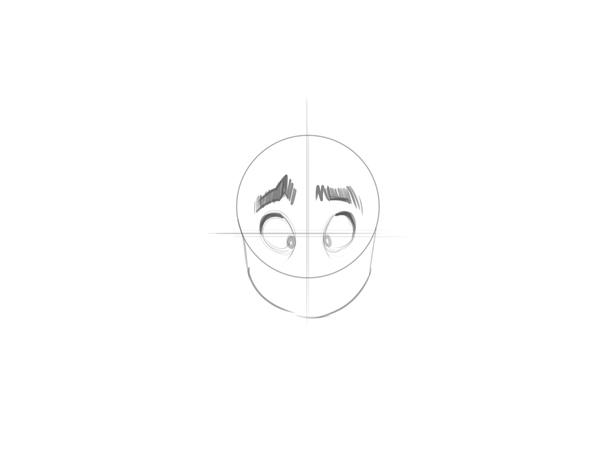
Step 4
When designing a nose being seen from the front, it is common not to use many details. If you draw only its tip, it is likely that already achieves a convincing effect. It is also very common detailing to draw only one side of the nose, from the idea that this is the opposite side of light.
Let's put the correct nose on our character.

Step 5
As our character is a child, we will make a cartoon mouth: something simple just to represent an expression of innocence.
Notice that when drawing a little child's mouth, the lips shouldn't be drawn! In cartoon style, children, regardless of gender, have quite simple mouths. A good and expressive trace already does the job.
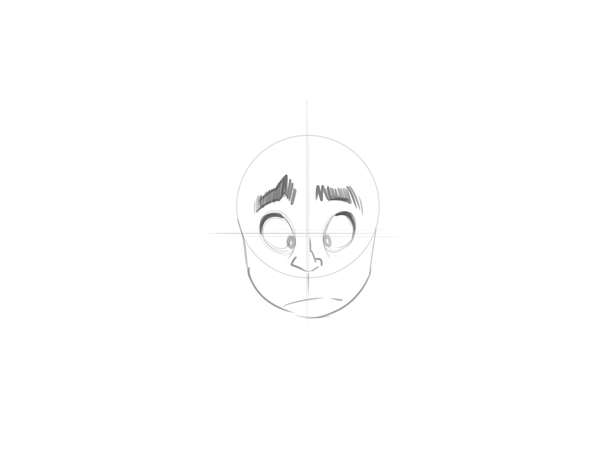
Step 6
The ears are seen from the front side view (because our character is facing the camera), so that the internal cavities will not appear. Then we will do just a simple shape using some basic perspective (more on that later).

Step 7
The shape of our skull is already defined by the circle we did at the beginning, right? So we just need a very simple and childish haircut to give life to our boy. Let's do it now.
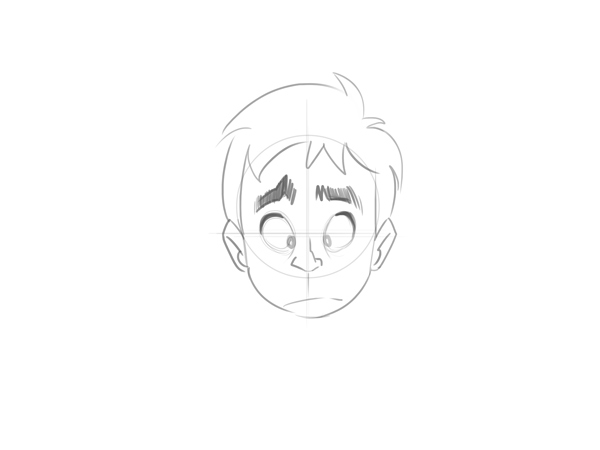
I Don't Know How to Draw Hair! Help!
Easy, easy... there is nothing to fear. Nobody needs to be stylist or fashion designer to make the perfect hair. There isn't a right way to draw hair, so you'll need to try until you create the ideal haircut you want. Just remember that the hair is responsible for defining the personality of our characters. Oddly enough, the hair can express age, rebellion, conservatism... incredible, isn't? Speaking of which... what is your hairstyle?! Oh, never mind...
An accurate and fast way to drawing cartoon hair is to seek photo references on the web! I do this all the time: grab a fashion magazine or try a Google search. After finding the ideal style, put the image as a reference next to your drawing board (or tablet) and start making a cartoon and simplified version of it.
Well, it seems we completed our character successfully! Congratulations!
Now let's play a bit more and create a completely different character leveraging the same template we used for little Tommy (yes, I created a name for him).
2. Create an Older Character
Step 1
As usual, let's start with the eyes. This time we will draw faster, adding wrinkles, eyebrows and the eye pupils.
Notice that we haven't changed a lot, we just expanded the eyebrow a bit. Older men have thicker eyebrows, occupying more space on the forehead. Eyelashes make no difference in men, they are always drawn in the same way.

Step 2
We will increase our chin a bit this time. Try something like this.
Our character is already with a different "look"! This is very good. We will proceed by choosing the ideal nose for it.

Step 3
Following what we did before, let's create the nose. This time I will make a completely different nose from before:
Notice that the ends of the nose are positioned very close to the bottom of the eyes. This is an effective technique to use when designing larger and wider noses. The idea is always to exaggerate to get a good result!

Speaking of overkill, let's eliminate the mouth of our character in favor of another artifact...
Step 4
I decided to use another technique now: instead of drawing the mouth, we'll simply draw a big mustache to create a better persona for our character.
Done! A big and exaggerated mustache for our old friend!

Step 5
Remember what I said about the hair helps to represent age and personality? Check it out.
We've just added some side hair and left him bald on top. Amazing how it creates a totally different look, isn't it? Also notice that I took the same ear from Tommy, our beloved boy. That's the advantage of working on templates. That's the magic of cartoon!

3. Create a Female Character
I don't know... I think Tommy needs a sister! He's been very lonely out there. Let's create a sister for him now, as if by magic:
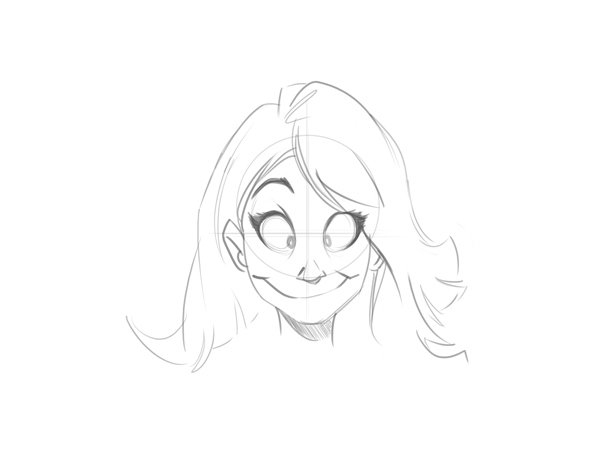
Hey!!! How did you do that so fast? Very simple ... Women have more delicate facial structures. Follow the step-by-step instructions below:
- Thin eyebrows;
- Larger and expressive eyelashes;
- Thinner chin;
- Small nose with less details;
- Long hair (use a real reference and choose any style you want).
That's it. These are all changes you need to do. Besides that, I took everything I could from Tommy, her brother. After all, they are siblings, right?
When you start to feel more comfortable, you can slowly create some more "realistic" details to your characters. Such as larger pupils...
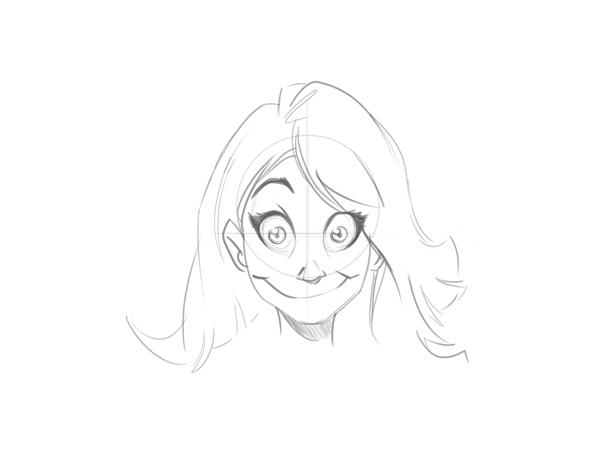
4. Facial Expressions
We are ready to add more emotions to our dear Lucy (yes, that's her name). Let's draw her after receiving the news that their school holidays have come to an end...
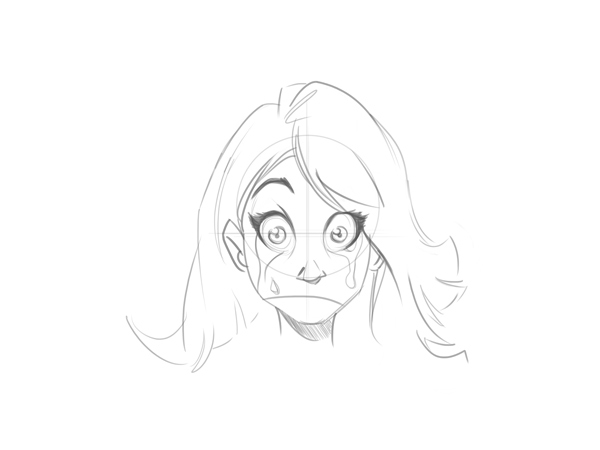
Again we achieve something totally different just adding two things: The tears and the new shape of her mouth! Isn't it amazing?!
Now let's get back to Tommy and ask him what he thinks about it:

Notice that I've totally changed his expression just following the steps below:
- Making one eyebrow lower than the other;
- Cutting the eyes in half with the eyelashes;
- Adding a smile (one side is higher, following the eyebrow);
- Moving up the eye pupils to stay under the eyelashes.
And that's it! We got the expected result with just these few changes. Hair, ears, nose, chin and the circular shape of the eyes are the same! Simple as that!
5. Profile View
Draw the template below again. Now we'll learn how to make Tommy and Lucy from the profile view:

We will fit the face of both now:
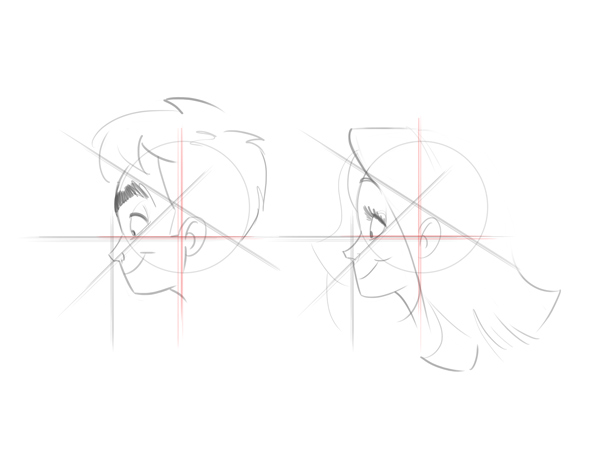
Be aware of the main differences in structure when comparing them side by side. Pay attention to these details when drawing male and female characters:
- Tommy's eyebrow is thicker
- Lucy's chin is slightly projected in front of the face
- Lucy's nose is thinner and pointed;
- Lucy has big and feminine eyelashes.
6. Play With Angles
Eyes, nose, mouth, ears... all the details that make up the face change its shape when viewed from different angles. It's very common to see cartoon characters looking at every possible direction with different camera angles, because they will need to react to situations and objects around them. This helps bring them more to life!

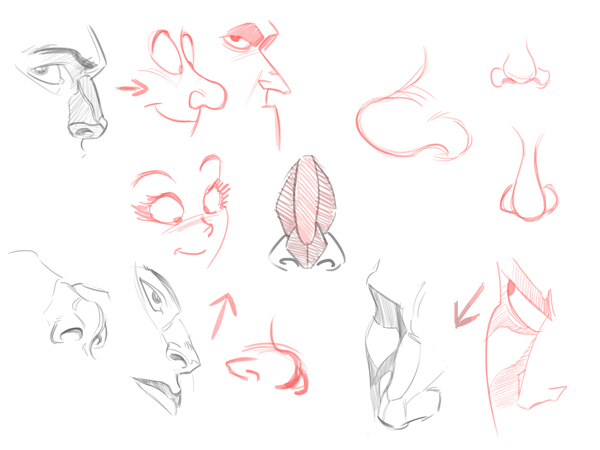

Now we will put into practice everything we have learned so far... Below follows a basic template (only circles and directional guides) where we can practice our drawing skills in different positions:
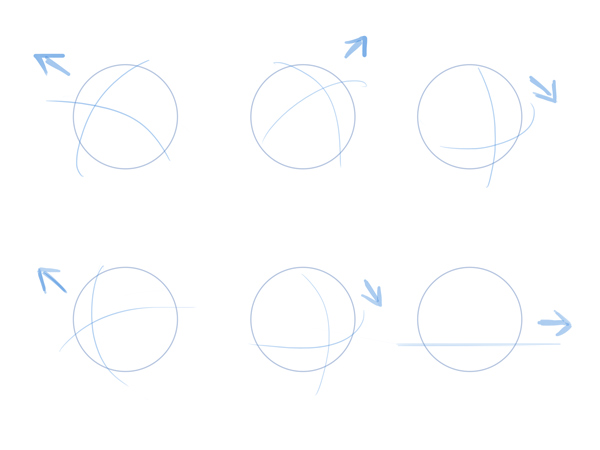
Let's mark the eyes in different directions for each one of the circles...

Now, let's add some random jaws, with different sizes and shapes...

It's up to you now. I guess you can walk alone and explore the techniques I gave to you to complete the drawings. Remember that cartoon style has two premises:
- Simplify the face details in rounded shapes;
- Exaggerate the facial expressions.
Once you managed to sketch the direction of the eyes and have chosen the proper chins, try to use your creativity to build how many faces you want. You can be sure that, if you practice at least 10 minutes per day of the techniques presented here, drawing cartoon faces will be as natural to you as breathing.
Let's summarize! To reinforce what I talked throughout the tutorial, let's remember the proper steps to draw cartoon faces:
- Make a circle that will represent the skull of our character;
- Set the direction in which your character will be looking at and draw the guidelines;
- Make the outline of the eyes in an oval shape;
- Draw the eye pupils (make them pointing to the nose, if you want a cute character). Don't forget the eyelashes;
- Choose the correct eyebrow, depending on the age and gender of your character;
- Draw an appropriate jaw;
- Draw simplified ears;
- Search haircut styles in Google (or a magazine) and use it as a guide reference for your sketch;
- Celebrate!
Below is my version:


7. Research Multiple Ethnicities
We are nearing the end of our tutorial. As a last tip, I would encourage you to continue experimenting with facial expressions and, whenever possible, to invest more in studies of the face. Learn how the eyes and mouth behave in different situations. Take a look at different ethnicities and the key features.
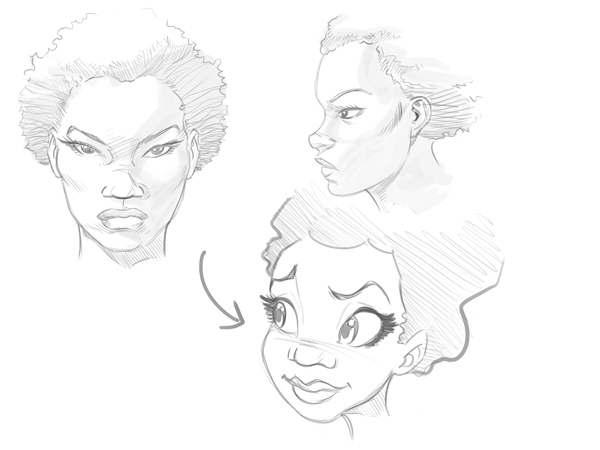
Whenever possible, try to give a little more realism to your characters. Observe the behavior of people in real life. Look at photos, study the style of your favorite artist or search for inspiration on the Internet. It's when we look to real life that we can extract quality information for our drawings. But remember: observing the real world does not mean copying! You want your character to be unique and not a copy of reality, right?
Great Job! There is More to Come!
Now you know the basic techniques used by the best cartoon artists around the world. There is plenty more to come and this is just a small fraction of the cartoon drawing tutorials I'll be presenting to you. Up next, we're going to dig deeper into cartoon expressions.
Take what you learn here and work on your first characters. You can earn a nice side-income selling your character designs on GraphicRiver as you ramp up your skills. Continue to grow your artistic skills and you can earn a full-time income as a cartoonist.
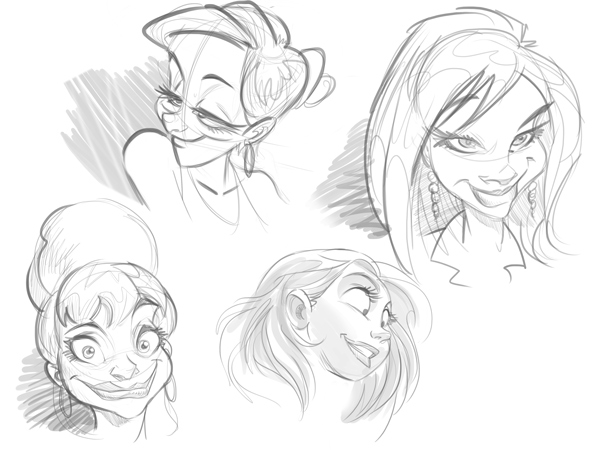



No comments:
Post a Comment